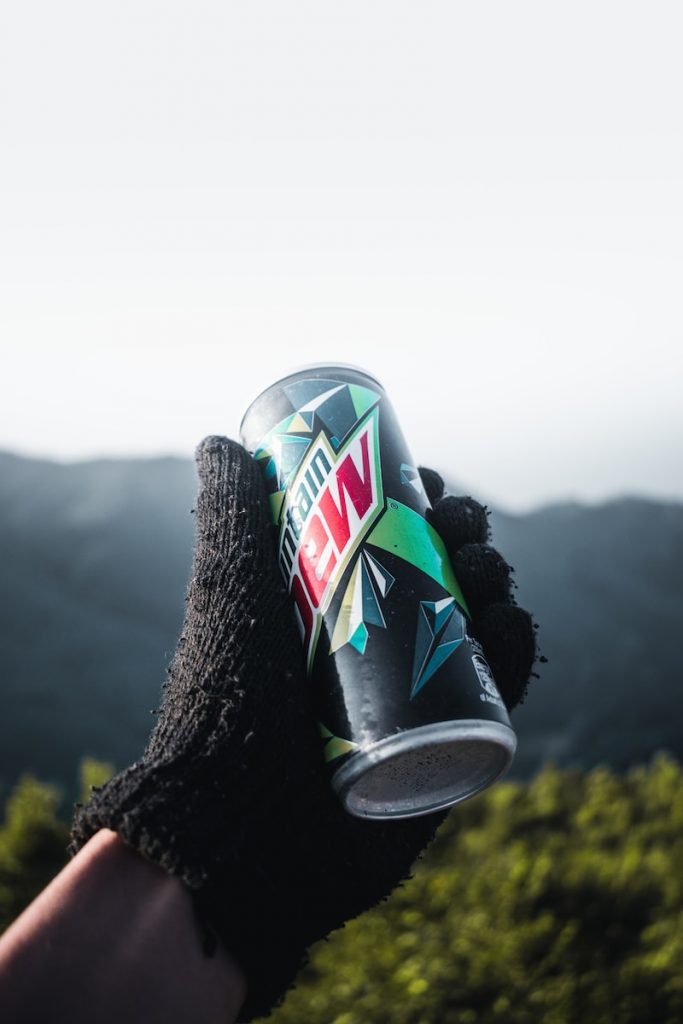Mountain Dew, a beloved soda by many, is renowned for its distinct, refreshing citrus flavor. However, an aspect of this popular beverage that often gets overlooked is its sugar content. This article delves into the question of how much sugar is in Mountain Dew, providing an in-depth analysis.
Mountain Dew: An Overview
Mountain Dew, a brand owned by PepsiCo, is one of the most popular carbonated beverages globally. Known for its unique citrus flavor, it has been a staple in the soda market since its national release in 1964.
Despite its popularity, like many other soft drinks, Mountain Dew has received criticism for its high sugar content, which can contribute to various health issues, including obesity, type 2 diabetes, and heart disease.
The Sugar Content in Mountain Dew
A 12-ounce can of Mountain Dew contains a staggering 46 grams of sugar. This is equivalent to approximately 3.8 tablespoons or 9.2 teaspoons. To put this in perspective, imagine filling a quarter cup with sugar and consuming it – that’s roughly the amount of sugar in a single can of Mountain Dew.
This sugar content is significantly higher than the daily recommended intake of added sugars set by the American Heart Association (AHA). The AHA suggests limiting added sugars to 36 grams per day for men and 25 grams for women. Consuming two cans of Mountain Dew would roughly triple this recommended daily amount.
How Does Mountain Dew Compare to Other Beverages?
Mountain Dew’s sugar content is one of the highest amongst soft drinks. It surpasses other popular sugary beverages, such as Coca-Cola, Pepsi, and Orange Fanta.
Here’s a quick comparison of sugar content in some popular drinks:
- Coca-Cola (12 oz) – 39 grams
- Pepsi (12 oz) – 41 grams
- Orange Fanta (12 oz) – 44 grams
- Mountain Dew (12 oz) – 46 grams
Interestingly, the only soda that barely tops Mountain Dew in terms of sugar content is Mello Yello, with 47 grams of sugar in a 12-ounce can.
The Health Implications of High Sugar Intake
Excessive sugar intake, particularly from sugary beverages like Mountain Dew, can lead to numerous health problems. The high caloric content combined with minimal nutritional value makes these drinks a significant contributor to weight gain and obesity.
Furthermore, consuming large amounts of sugar can increase the risk of developing type 2 diabetes and heart disease. It can also result in tooth decay, as the sugar in the beverage combines with bacteria in the mouth to form acid, which attacks the teeth.
Raising Awareness: The Hidden Sugar in Beverages
Many consumers may be unaware of the high sugar content in their favorite beverages. Even seemingly healthier options like fruit juices and iced teas can contain alarming amounts of sugar. For instance, a 16-ounce bottle of apple juice has around 13 teaspoons of sugar, while a 23-ounce can of Arizona Green Iced Tea contains 20 teaspoons.
Strategies to Limit Sugar Intake
Given the health risks associated with high sugar consumption, it’s crucial to find ways to limit intake. Here are a few strategies:
- Drink water: The best beverage choice for quenching thirst is water. It has zero calories and no sugar, making it the healthiest option.
- Limit soda consumption: Try to minimize the amount of soda you drink. If you can’t eliminate it entirely, consider reducing the portion size.
- Choose healthier alternatives: Opt for beverages with less sugar, such as unsweetened iced tea or sparkling water.
- Practice mindful eating: Being aware of what and how much you’re consuming can help you make healthier choices.
The Takeaway
While the refreshing taste of Mountain Dew can be hard to resist, it’s essential to be aware of the high sugar content and the potential health risks that come with it. Moderation is key when it comes to enjoying sugary beverages.
Remember, understanding how much sugar is in Mountain Dew and other favorite drinks is a crucial step towards making healthier dietary choices.







